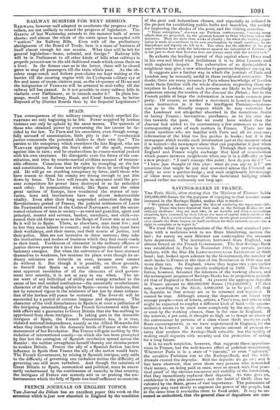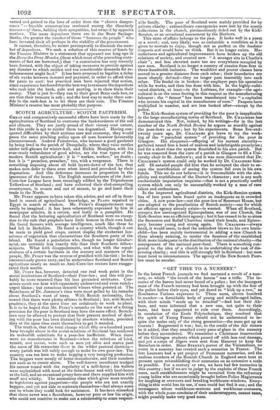SAVINGS-BANKS IN FRANCE.
THE Paris Sieele, after stating that the Minister of Finance holds 100,000,000 francs for the purpose of repaying to that amount sums invested in the Savings-Banks, makes this remark- " We protest in advance against the idea of rendering the repayment obli- gatory. Those who have deposited their cash in the Savings-Banks are not ordinary creditors : they are men who, in an humble and often a necessitous situation, have increased by their labour the mass of capital which exists in the country. Such a meritorious class of citizens merits great consideration: and even should the State impose on itself sacrifices for their interest, no one has a right to complain or to regret it."
We trust that the apprehensions of the SiMe, not unmixed per- haps with a malicious wish to see State blundering, outrun the fact ; for surely no sane Minister can contemplate the measure here deprecated. The institution, borrowed from England, was almost forced on the French Government. The first Savings-Bank was established in Paris in November 1818, by certain private bankers, with the Due DE LAROCHEFOUCAULD-LIANCOURT at their head ; but, looked upon askance by the Government, the number of such banks in France at the time of the Revolution in 1830 was not more than ten. In England, where they began two years earlier than in France, they were greatly multiplied by 1830. The Revo- lution, however, favoured the interests of the working classes, and the subsequent progress of Savings-Banks has in proportion exceed- ed that of England or Scotland. At present the aggregate deposits in France amount to 360,000,000 francs (10,440,000/.) Of that sum, according to the Sieck, 4,000,0001. is to be paid off; that is, deposits to that extent are to be returned and repulsed. It cannot be true. Although among the depositors are found very strange people—men of letters, artists, a Peer's son, and others who might be expected to employ a different kind of bank—the accom- modation seems to be used more completely by the needy classes, or even by the working classes, than is the case in England. If the interest, 4 per cent, is thought so high as to tempt an abuse of the convenience by persons of a class whose thrift needs no such State encouragement, as we have experienced in England, let the interest be lowered. It is not the precise amount of present re- turns that renders the Savings-Bank valuable, but the facility of making small deposits with security and the protection of saving for a long future. It is no such suspicion, however, that suggests these apprehen- sions in France, but the well-known effect of political disturbance. Whenever Paris is in a state of " etneute," or even "agitated," the sensitive Parisians run to the Savings-Bank, and the with- drawals exceed the deposits. Still the deposits do go on ; and it has been observed, that even those very persons who demanded their money, on being paid at once, were so struck with that prac- tical proof of the obvious resources and stability of the institution, that they immediately replaced their deposits. As time goes on, confidence in the plan increases ; and the habit of thrift, thus in- culcated by the State, grows of vast importance. The possession of property may tend slowly to augment the power of the people, but at the same time it reconciles them to fixed order. It may be as- sumed as undoubted, that the general visas of depositors are con..
verted and gained to the love of order from the "classes danger- euses " — humble conservatives stationed among the disorderly masses—of them, holding their sympathies, but swayed by opposite motives. The more depositors there are in the State Savings. Banks, the greater the number of those " homines du peuple " who have invested their all perhaps in the stability of the government.
It cannot, therefore, be meant peremptorily to diminish the num- ber of depositors. We seek a solution of this reserve of funds by the Finance Minister in a statement that appeared not long ago in the Revuedes Deux Mondes, (from which most of the preceding state- ments of fact are borrowed,) that "a commission has very recently been formed, with the object of taking measures to provide against any disaster to which sudden and too considerable demands for re- imbursement might lead." It has been proposed to legalize a delay of six weeks between demand and payment, in order to afford time for panic to cool: but practical men have rejected that notion, since experience has found that the best way to reassure the depositors who rush into the bank, pale and panting, is to show them their money. That is just it—they run to their great State cash-box, to see that their treasure is safe ; and the best way to make them con- fide in the cash-box is to let them see their coin. The Finance Minister's reserve has most probably that purpose.



























 Previous page
Previous page